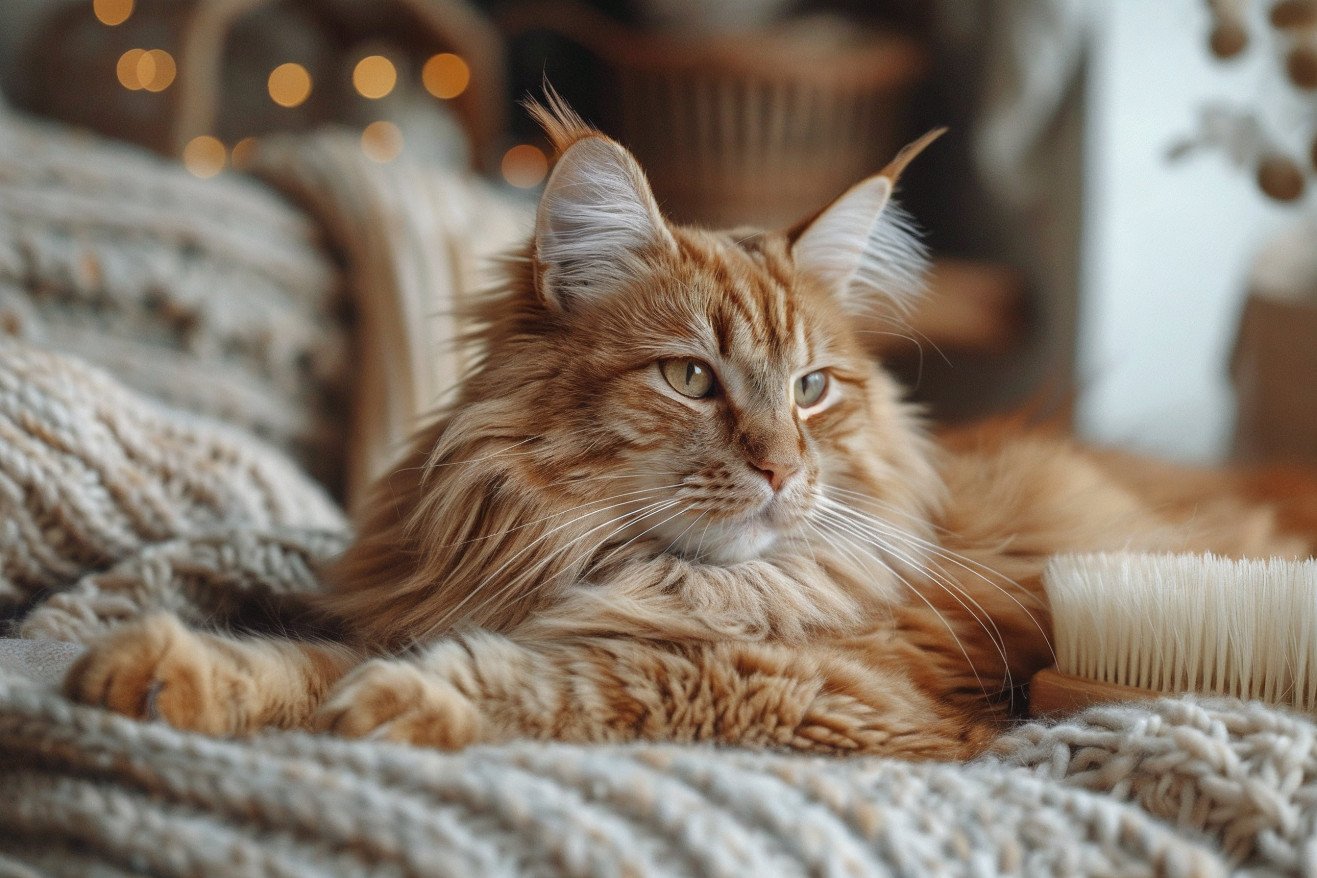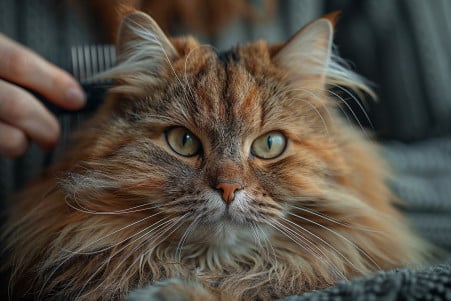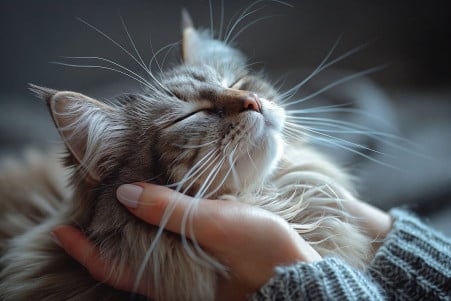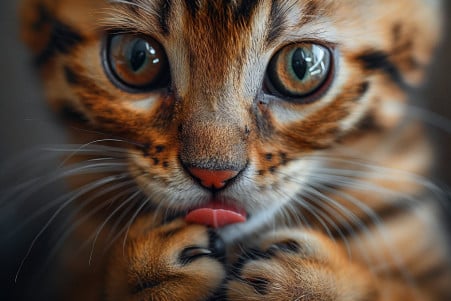Are Maine Coon Cats Hypoallergenic? What You Need to Know
21 February 2024 • Updated 21 February 2024

With their long, luxurious coats, Maine Coons are one of the most beautiful cat breeds, but are they also one of the most hypoallergenic? Maine Coon cats are not hypoallergenic, but they are less likely to trigger allergies than other breeds. This is because they produce fewer allergens and have less dander than many other cats.
This article will cover a wide range of research and expert opinions from the fields of veterinary science, genetics, and animal care to help you understand how genetics, nutrition, and the environment impact the hypoallergenic nature of Maine Coon cats.
By the end of this investigation, you will have the information you need to know why Maine Coon cats are not hypoallergenic and how to best care for them in a way that minimizes the impact of their allergens.
Are Maine Coon cats hypoallergenic?
Why Do Maine Coons Shed Seasonally?
The Maine Coon’s coat is a marvel of nature, having evolved to help the breed adapt to the harsh New England climate. The triple-layer coat is designed to keep the cat warm in the winter and cool in the summer, and it even has a water-resistant quality to protect the cat from the elements.
The Maine Coon’s coat is made up of two dense, short undercoats and a long, waxy, semi-water-repellent outer guard coat, which helps to keep the cat warm and dry in cold and wet weather. This is why the Maine Coon’s coat is so thick and luxurious.
The Maine Coon’s coat is also designed to change with the seasons. A study published on PubMed found that the length of the outer coat and undercoat changes seasonally, with the coat growing longer and thicker in the winter and shorter and thinner in the spring and summer.
This is due to the photoperiodic response, which causes the coat to grow when the days are shorter and the coat to shed when the days are longer.
Seasonal shedding can be managed with a combination of regular grooming and making sure your cat is comfortable in its environment. Regular brushing can help remove the dead hair that causes shedding and hairballs, and making sure your cat is comfortable in its environment can help ensure that it doesn’t shed more than it needs to.
It’s also worth noting that not all Maine Coons will shed in the same way. Genetics and environmental factors can cause individual variation in shedding, and some cats may shed more than others. By understanding these factors and taking steps to manage them, you can help ensure that your cat’s coat stays healthy and beautiful throughout the year.
Diet and Maine Coon Coat Health and Shedding
Diet is another important factor in keeping a Maine Coon’s coat in top condition and managing shedding. Certain nutrients, including omega-3 and omega-6 fatty acids, are especially important for skin and coat health. KatKin notes that a high-protein, low-carbohydrate diet with a good fat profile is best for Maine Coon cats.
Different diets can have different effects on a Maine Coon’s shedding. A raw diet with a high meat content, for example, may lead to a healthier coat and less shedding. On the other hand, some cat owners, including those at Sassy Koonz, have found that certain dry cat foods, when combined with wet foods, have helped them keep their Maine Coons healthy and their shedding under control.
There are also cat foods on the market that are specifically formulated to improve coat health, but it’s important to make sure they work for your cat. Maine Coon Cat Nation suggests that you look for high-quality cat foods that are high in protein to help support a healthy coat and potentially reduce shedding. They also recommend a mix of dry, wet, and occasional raw meat.
When choosing a diet for your Maine Coon, make sure to prioritize quality and pay attention to how your cat reacts to different foods. A diet that supports a healthy coat is likely to help you manage shedding and support your cat’s overall health.
Genetics of Maine Coon Cat Shedding
The genetics of Maine Coon cats are closely tied to their shedding patterns, as well as their regal appearance and other aspects of their care.
Genetic factors, including the fibroblast growth factor 5 (FGF5) gene, determine the characteristics of a Maine Coon’s coat, including its length and texture.
According to the Veterinary Genetics Laboratory, mutations in the FGF5 gene are responsible for the long hair that Maine Coons are known for. A deeper understanding of genetics can also help identify genetic predispositions to coat-related health problems and shedding patterns, which can be especially helpful for cat owners who are trying to keep up with their pets’ grooming needs.
Genetic tests that identify traits like hair length can be used to predict a Maine Coon’s shedding patterns. For example, Maine Coons with mutations in FGF5 will have longer hair and may need to be groomed more frequently. According to MaineCoon.org, genetic factors that determine the breed’s size and coat variations, as well as genetic diseases such as Hypertrophic Cardiomyopathy, can affect overall health and therefore shedding.
Knowing about these genetic factors can help cat owners take a proactive approach to care and customize their care to their Maine Coon’s individual needs. By addressing potential problems before they become serious with a combination of grooming and environmental changes, cat owners can make sure their pets are healthy and happy.
Coping With Shedding in Indoor Maine Coons: The Environmental Impact
The indoor environment has a major impact on Maine Coon shedding patterns. The temperature and humidity in our homes can interfere with the natural cues that tell a cat when to shed. As a result, indoor Maine Coons often shed year-round rather than seasonally. Vets4Pets notes that indoor cats don’t experience the temperature fluctuations that trigger the hormones that control seasonal shedding.
Artificial light is another key factor in year-round shedding. Natural light is the trigger for the shedding process, and the constant light of indoor environments can disrupt a cat’s shedding cycle. Cat’s Best says that a lack of exposure to natural light may be why indoor Maine Coons shed evenly throughout the year.
To help control shedding, you can create an environment that more closely matches the outdoors. This means adjusting the temperature in your home to better reflect the seasons and using lighting that more closely mimics the natural light of the sun. In addition to these environmental changes, PawTracks stresses that regular grooming is important for keeping your Maine Coon’s shedding in check and ensuring that its coat stays healthy and beautiful.
How to Keep Maine Coon Shedding Under Control
Keeping Maine Coon shedding in check is a combination of the right tools and the right technique. Regular grooming, ideally daily, is a must, especially during shedding season, which Hepper notes can happen in the spring and fall.
A wire slicker brush is great for getting out tangles and dead hair, while a rubber brush is softer on the skin. Deshedding tools, like undercoat rakes, are also helpful. These tools can get down into the thick fur and pull out the loose undercoat without damaging the guard hairs.
Bathing can also help keep shedding in check. While not all cats like water, Maine Coons are more likely to tolerate baths than other breeds. That said, Maine Coon Central recommends using cat shampoos and starting the bathing process when they are kittens.
By making these practices part of a regular routine, you can keep shedding under control and strengthen your bond with your Maine Coon. It’s also important to make sure your cat has access to fresh water, potentially from a pet fountain, as Maine Coon Central notes that hydration is important.
Finally, work through issues like a cat’s dislike of grooming by slowly introducing tools and practices and pairing them with positive experiences. With time and the right strategy, you can maintain your Maine Coon’s beautiful coat while keeping the fur in your home to a minimum.
Accepting the Shed: A Note on Maine Coon Grooming
As impressive as the Maine Coon’s luxurious triple coat is, it also means that they shed. While Maine Coons are prone to seasonal shedding, which is impacted by the amount of daylight and temperature, indoor living can cause them to shed all year long on a more regular schedule.
This is why Maine Coon Central stresses the importance of grooming your cat regularly. Not only does it help keep their coat healthy, but it also helps you bond with your cat.
Of course, diet is also important when it comes to coat health, and omega-3 and omega-6 fatty acids are two nutrients that are especially important. According to Hepper and Maine Coon Central, a good diet can help reduce shedding and keep your cat healthy overall. Genetics also play a role, and genes like FGF5 can determine a cat’s coat length and how much they shed.
To keep your Maine Coon looking and feeling their best, it’s important to understand and control these factors. So, while it can be a little intimidating, shedding is a normal part of life with these cats that can be managed. By staying open to new information and adjusting your care routine as needed, you can find a way to coexist peacefully with these gentle giants.


